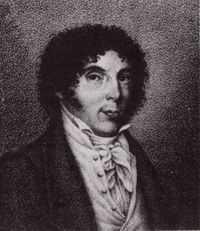You can help expand this article with text translated from the corresponding article in French. (September 2010) Click [show] for important translation instructions.
|
Stefano Pavesi | |
|---|---|
 | |
| Born | 22 January 1779 Casaletto Vaprio, Italy |
| Died | 28 July 1850 (aged 71) Crema, Italy |
| Occupation | Composer |
Stefano Pavesi (22 January 1779, Casaletto Vaprio – 28 July 1850) was an Italian composer. He is primarily known as a prolific opera composer; his breakthrough opera was Fingallo e Comala, and his acknowledged opera masterpiece is Ser Marcantonio.[1] He also served as the maestro di cappella of Crema Cathedral from 1814 to 1818 (shared with Giuseppe Gazzaniga), and alone from 1818 (upon Gazzaniga's death) until his death at the age of 71.[1][2][3][4]
His first music studies were in Crema (neighboring his birthplace), followed by studies in Naples. While in Naples, Pavesi actively joined the Parthenopean Republic. After its suppression, Pavesi was denounced, imprisoned, and deported to France (allegedly Cimarosa intervened to prevent his execution). In France he played the serpent in Napoleon's army band and remained in Italy after the Battle of Marengo. He returned to Crema in 1814 after the Austrian occupation of northern Italy after the War of the Sixth Coalition. He suffered a stroke in 1831 after the failure of his opera Fenella.[1]
- ^ a b c composer., Pavesi, Stefano, 1779-1850. Dies irae concertato. ISBN 978-1-9872-0426-1. OCLC 1142438023.
{{cite book}}: CS1 maint: multiple names: authors list (link) CS1 maint: numeric names: authors list (link) - ^ Cite error: The named reference
DBDIwas invoked but never defined (see the help page). - ^ Cite error: The named reference
Grovewas invoked but never defined (see the help page). - ^ Cite error: The named reference
Palmawas invoked but never defined (see the help page).